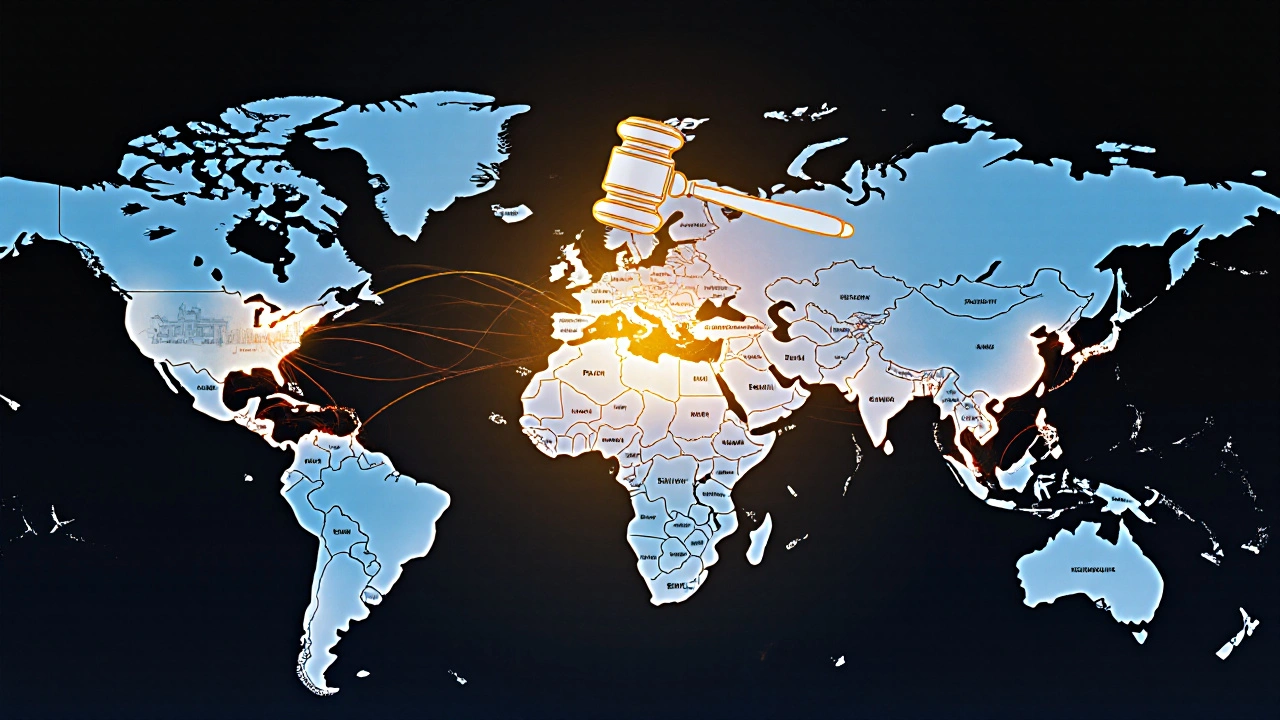Governing Law and Jurisdiction in the UK: Choosing the Right Venue for IP Disputes
22 Nov, 2025When you’re drafting a contract involving intellectual property in the UK, one of the most overlooked but critical decisions is governing law and jurisdiction. It’s not just legalese-it’s the difference between winning a case in London and losing it in Edinburgh. If your patent, trademark, or copyright agreement ends up in court, where you’ve chosen to resolve disputes can make or break your business. Many companies assume it doesn’t matter as long as the contract is signed. That’s a dangerous myth.
What Governing Law Actually Means
Governing law tells you which country’s legal system will interpret the contract. If your agreement says "this contract is governed by English law," then every clause-whether it’s about ownership of a design, licensing terms, or breach remedies-will be read through the lens of English courts and statutes. It’s not about where the parties live or where the deal was signed. It’s about which legal rules will apply.
England and Wales have a well-established body of case law around intellectual property. For example, the Copyright, Designs and Patents Act 1988 is the backbone of UK IP rights. If your software code or brand logo is copied, English courts have decades of precedents on what counts as infringement, how damages are calculated, and whether an injunction should be granted. Scotland and Northern Ireland have separate legal systems, so if you don’t specify, you risk ambiguity.
Most international businesses choose English law because it’s predictable. Judges rely on precedent, not personal interpretation. That means if your competitor copied your patented process last year and lost in a similar case, you can reasonably expect the same outcome. This consistency matters when you’re spending six figures on legal fees.
Jurisdiction: Where the Case Gets Heard
Jurisdiction is different. It answers the question: where will the lawsuit be filed and heard? You can have English law governing your contract but still agree to settle disputes in the High Court in London, the Intellectual Property Enterprise Court (IPEC), or even a court in Germany if you’re dealing with EU partners.
The UK has a specialized court for IP cases: the Intellectual Property Enterprise Court (IPEC). It’s designed for small to mid-sized businesses. Claims here are capped at £500,000 in damages, and legal costs are capped at £500,000 for the entire case (not per side). That’s a huge advantage over the regular High Court, where costs can spiral into millions. If you’re a startup protecting a trademark or a designer suing over copied artwork, IPEC is often the smartest choice.
But here’s the catch: IPEC only handles cases within England and Wales. If your contract says jurisdiction is in London, but your opponent is based in Glasgow, you still have to go to London. That can mean flying witnesses, hiring local solicitors, and paying for translation if documents are in another language. You need to weigh convenience against legal advantage.
Why You Can’t Just Pick the Nearest Court
Some companies assume they should pick the jurisdiction closest to their headquarters. If you’re based in Manchester, you pick Manchester. If you’re in Bristol, you pick Bristol. That’s a mistake.
IP cases are complex. They often require technical experts, patent attorneys, and judges who understand design rights or software algorithms. Only a few courts in the UK have the expertise. The IPEC in London is the most experienced. Even the Chancery Division of the High Court in London handles more IP cases than any other region. Outside London, judges may not have handled more than one or two IP disputes in their entire career.
Also, enforcement matters. If you win a judgment in Cardiff but the infringer’s assets are in Birmingham, you’ll need to register your judgment in another jurisdiction to seize property. That adds months and thousands in legal fees. Choosing a central, well-resourced venue like London reduces post-trial headaches.

Common Mistakes in Drafting Clauses
Many contracts have vague or conflicting jurisdiction clauses. Here are the three most common errors:
- "Any court with jurisdiction" - This opens the door to forum shopping. Your opponent can file in a remote, inconvenient court just to delay or increase your costs.
- Mixing governing law and jurisdiction - "This agreement is governed by UK law and disputes shall be resolved in the UK." That’s meaningless. UK law isn’t a single system. Which part? England? Scotland? And which court?
- Forgetting to specify exclusivity - If you say "jurisdiction is in London," but don’t say "exclusive," your opponent can still sue you in New York or Singapore. Always add "exclusive jurisdiction" if you want to control where the case goes.
Here’s what a clean clause looks like:
"This agreement shall be governed by and construed in accordance with the laws of England and Wales. The parties irrevocably submit to the exclusive jurisdiction of the courts of England and Wales, including the Intellectual Property Enterprise Court, for the resolution of any dispute arising out of or in connection with this agreement."
That’s specific. It’s enforceable. And it saves you from months of legal wrangling later.
What Happens If You Don’t Choose?
If your contract is silent on governing law and jurisdiction, English courts will step in-but not how you’d expect.
Under the Brussels I Regulation (recast), which still applies to UK cases post-Brexit for contracts signed before 2021, and under the UK’s own common law rules now, the court will look at:
- Where the contract was performed
- Where the parties are based
- Where the IP was created or used
- Which jurisdiction has the closest connection
That’s a mess. Imagine you’re a US company licensing a UK trademark to a distributor in Germany. The product is sold in France. The infringement happens in Spain. Who gets to pick the court? Everyone does. You’ll end up with parallel lawsuits in four countries, each with different rules, timelines, and costs.
Without a clear clause, you’re at the mercy of the court’s interpretation-and that’s a gamble no business should take.

Real-World Example: The Case of the Copied Fashion Design
In 2023, a London-based fashion brand sued a competitor in the IPEC for copying its signature jacket design. The contract had a clear clause: "governed by English law, exclusive jurisdiction in the IPEC." The defendant tried to move the case to a regional court in Manchester, arguing it was "more convenient." The judge dismissed the motion. Why? Because IPEC was designed for exactly this kind of dispute. The case was resolved in 8 months. The brand won £210,000 in damages and an injunction blocking sales.
Had the contract said "UK law" or "any court," the case could have dragged on for two years, cost over £1 million, and ended in a settlement far below what they deserved.
Choosing the Right Venue: A Quick Decision Guide
Here’s how to pick the right jurisdiction for your IP agreement:
- Small claims under £500k? Go with IPEC. Lower cost, faster, judges who know IP.
- High-value patent or trademark case? High Court (Chancery Division), London. Only place with full technical expertise.
- Parties based outside the UK? Still choose England and Wales. It’s the most recognized and enforceable system globally.
- Working with EU partners? Even after Brexit, English courts are still preferred for IP. Many EU companies agree to English jurisdiction because they know it’s reliable.
- Need speed? IPEC cases average 8-12 months. High Court takes 18-24 months.
Don’t let convenience override competence. A court 50 miles away that doesn’t handle IP cases regularly is worse than a court 300 miles away that does.
Final Tip: Update Your Contracts Regularly
IP law changes. Brexit changed how enforcement works across borders. The UK’s new Digital Markets, Competition and Consumers Act 2024 introduced stricter rules on online counterfeiting. If your contract was written in 2020, it might not reflect current realities.
Review your IP agreements every 18-24 months. Make sure your governing law and jurisdiction clauses still make sense. If you’re expanding into Asia or the US, you might need separate clauses for those markets. Don’t assume one clause fits all.
Choosing governing law and jurisdiction isn’t about legal technicalities. It’s about control. It’s about predictability. It’s about protecting your brand, your innovation, and your bottom line. Get it right upfront-or pay for it later in court.
Can I choose Scottish law instead of English law for my IP contract?
Yes, you can. Scotland has its own legal system and distinct IP rules under the Copyright, Designs and Patents Act 1988 as applied in Scotland. However, Scottish courts handle far fewer IP cases than England and Wales. If your business operates internationally or you want enforceable precedents, English law is more widely recognized and predictable. Only choose Scottish law if your core operations, team, or IP creation are based in Scotland.
Does choosing English jurisdiction mean I can’t sue in the US?
If your contract includes an exclusive jurisdiction clause in England, your opponent cannot legally file a lawsuit against you in the US for the same dispute. US courts generally respect such clauses, especially if they’re clear and both parties agreed. However, if your opponent owns assets in the US, you may still need to enforce your UK judgment there, which requires a separate legal process.
Is IPEC really faster than the High Court?
Yes. IPEC cases typically resolve in 8 to 12 months. High Court IP cases take 18 to 24 months on average. IPEC limits disclosure, restricts expert reports, and caps legal costs, which speeds up the process. It’s designed for SMEs who need speed, not endless litigation.
What if my contract doesn’t mention jurisdiction at all?
If your contract is silent, UK courts will determine jurisdiction based on where the contract was performed, where the parties are based, and where the IP was used. This creates uncertainty. You might end up in a court far from your business, facing unfamiliar procedures and higher costs. Always specify jurisdiction-it’s one of the cheapest legal protections you can add.
Can I change the jurisdiction after signing the contract?
You can only change jurisdiction if both parties agree in writing. Once a dispute arises, one party can’t unilaterally move the case to a different court. That’s why it’s crucial to get it right before signing. If you anticipate future expansion, build flexibility into your contract with clear amendment procedures.
If you’re drafting or reviewing an IP agreement, don’t skip the jurisdiction clause. It’s not a formality-it’s your legal safety net. Get it wrong, and you’re gambling your IP on luck. Get it right, and you’re building a foundation that lasts.
